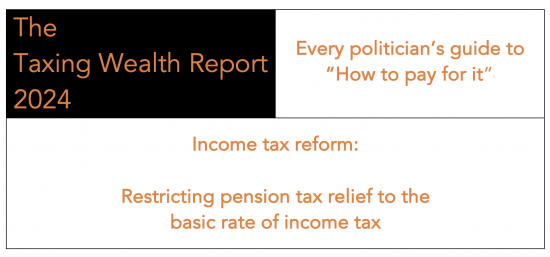The first of the thirty or so recommendations for tax reform to be made in the Taxing Wealth Report 2024 has been published this morning. It looks at the cost of pension tax relief for the highest earners in the UK who are provided with that relief at the 40 per cent and 45 per cent rates of tax at present.

This note is of almost 3,000 words and so too long to share here. The brief summary says:
Brief summary
This note suggests that:
- The higher rates of tax relief on pension contributions made by those who are 40 per cent and 45 per cent taxpayers in the UK are inappropriate. Everyone should get tax relief on their pension contributions at the same rate of 20% that is now made available to basic rate taxpayers.
- All such higher rate tax reliefs be abolished with some restriction on associated national insurance reliefs also being made.
- As a result, £12.5 billion of tax reliefs might be withdrawn each year, plus maybe £2 billion of national insurance reliefs. As a result, that much additional tax will be paid.
- If this recommendation is adopted the cost of tax reliefs on pension contributions made by higher-rate taxpayers in UK might still amount to approximately £24 billion a year, or £5,450 a year each, compared to approximately £8,750 a year each at present. The average basic rate taxpayer receives a subsidy of approximately £1,050 a year on their pension contributions at present.
- Changing these reliefs will not seriously change the savings habits of the people impacted as pensions will remain by far the most attractive tax-incentivised savings arrangement available to them and more than eighty per cent of UK financial assets are held in tax-incentivised savings arrangements.
Additional comments
This proposal is one of the most straightforward of all those in the Taxing Wealth Report 2024. The data that underpins all the findings comes straight from that published by HM Revenue & Customs. The restriction would be easy to introduce, in stages if that was politically necessary.
Retaining this relief is very hard to justify. It cannot be right that the most well-off in the UK get tax relief on their pension savings of £8,750 on average each year, which sum is only a little less than the basic UK state pension (£10,600 pa at present). Reform to end this obvious economic injustice is overdue for that reason.
Reform is also required because it is inappropriate to provide higher rates of tax relief on savings to the already wealthy than that provided to those less well-off. Doing so is clearly economically and ethically unjustifiable.
£14.5 billion could be raised by this reform, which is more than many suggest could be raised by a wealth tax each year.
The report on which this note is based
The note on which these observations are based is available here. If commenting, please read that note first.





